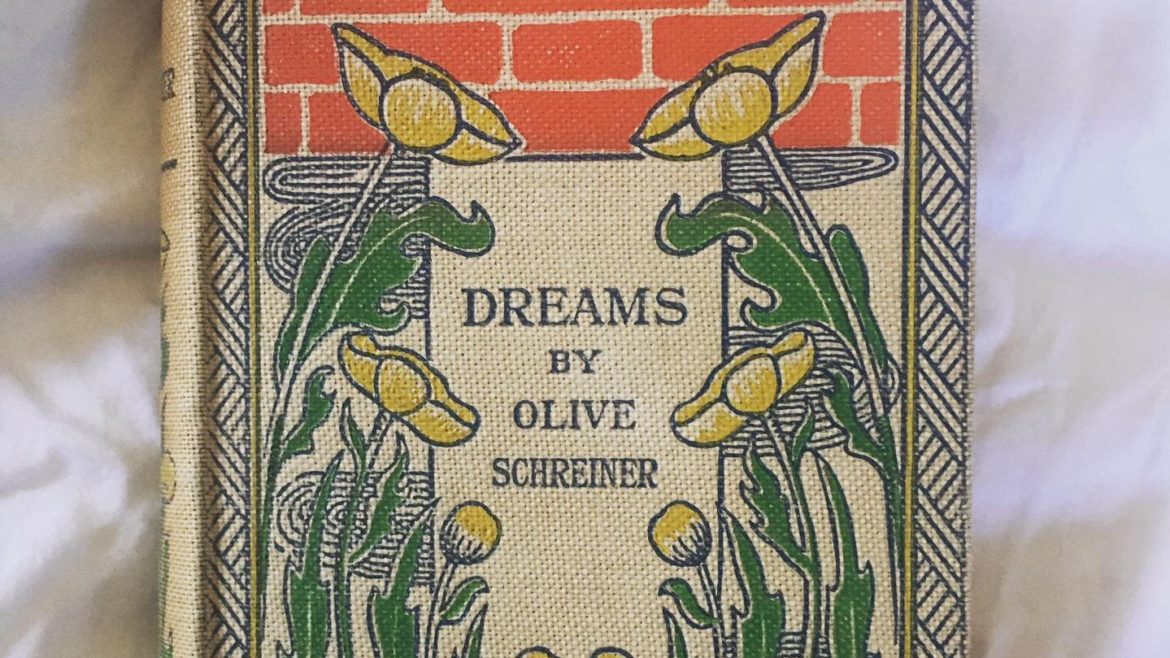As y’all may or may not have noticed, my last few posts have vaguely mentioned the fact that I was working on my M.A. thesis and that it was consuming my life until it very suddenly wasn’t anymore.
Like most graduate students, I focused my research on a topic that was incredibly interesting to me. I hoped my topic would be something that would maintain my attention months into the actual project, spurring me toward completion even when I was burnt out by academic journals and archival digs.
This focus was doubly important to me because, alongside my thesis work, I also dedicated myself to working with two colleagues to republish the work of fiction that was the focus of my thesis.
In that tunnel vision, I failed to realize that the subject of my thesis, a woman named Olive Schreiner, was actually the shero that I needed. Now that I’m finished, I hope that she can bring love and light to you as well.
Olive Schreiner’s Dreams
Olive Schreiner was a late-Victorian writer who spent the vast majority of her life working for women’s suffrage both in the UK and in her South-African homeland. A white woman and the child of missionaries to colonial Africa, Schreiner ultimately became ostracized from the socialist London elite with whom she had initially worked due to her insistence that Black Africans also be granted the right to vote alongside white women.
Although Schreiner’s debut novel, The Story of an African Farm, is her only text still widely circulated, at the time, Schreiner’s small book of allegories entitled Dreams was also incredibly popular.
Carried in pocket-sized editions by imprisoned suffragettes enduring hunger strikes and forced feedings in the UK, Dreams became a staple of the suffrage movement. The book was so popular that it was also published widely by a socialist imprint in the U.S. and was cited as an inspiration by American feminist, Charlotte Perkins Gilman.
Dreams is a strange little book. It has no apparently-perceptible narrative through-line, but its unifying theme is one of suffering for the sake of change. The dream most often cited by suffragettes, “Three Dreams in a Desert,” includes a passage where a woman must cross a river simply to make a track for those who would follow in her footsteps.
In another dream, an artist paints with the most beautiful color, which Schreiner ultimately reveals is his blood. As the artist paints, he dies. But, at the end of the dream, his works “live.” In these dreams, hope is born out of selfless sacrifice. By being willing to make the path, we create a better future.
Though such stories are still present in literature today (Harry Potter comes most immediately to mind), we as modern readers are reluctant to think of our own lives in the same terms. At least, we’re reluctant until we know there’s a happy ending. Then, and only then, are we happy to exclaim, “I’m a brave Gryffindor!” or “loyal Hufflepuff!” never fully embodying the complex dedication to sacrifice that is the backbone of the stories we hold so very dear.
In this weird and horrible time, I think a lot about sacrifice and suffering. I am lucky. I have experienced deep suffering and pain, but my present existence is safe and comfortable.
I am one of the few people currently enduring this epidemic with few inconveniences other than being stir crazy from staying cooped up at home. Because of that reality, it is easy to feel afraid that I will lose my comfort and security.
What if I or my husband get really, really sick? What if the economy doesn’t recover? What if my life doesn’t look like this anymore? How bad will it really be?
But, all of those concerns and questions are all about myself. They ignore the reality that, for many people, the present is as bad as my hypothetical future.
My fears are crippling not because anything is actually wrong, but because I’m afraid that taking a risk (I don’t mean like an actual health risk. Please don’t drink disinfectant y’all.) might make my existence less comfortable.
Overcoming Fear
Fear is always part of great stories. So also is the protagonist’s reluctance to give up their own comfort for the sake of a brighter future. But, great stories are born when we deny our fear and pursue a better reality—not for ourselves, but for others.
All of Schreiner’s Dreams are available on Project Gutenberg, and I encourage you to read them in their entirety there. Here though, I will include the end of one of my favorites, “A Dream of Wild Bees.”
In it, a pregnant mother falls asleep and dreams of being visited by fuzzy bees who offer to touch her child and imbue him with some form of earthly pleasure: health, wealth, love. But, in the end, she chooses for him not pleasure, but a life of seeking:
“And he leaned forward and laid his hand upon the sleeper, and whispered to it, smiling; and this only she heard—‘This shall be thy reward—that the ideal shall be real to thee.’
And the child trembled; but the mother slept on heavily and her brain-picture vanished. But deep within her the antenatal thing that lay here had a dream. In those eyes that had never seen the day, in that half-shaped brain was a sensation of light! Light—that it never had seen. Light—that perhaps it never should see. Light—that existed somewhere!
And already it had its reward: the Ideal was real to it.”
My hope is that, in this difficult time, the ideal may be made real to us. And that we would seek light no matter the cost, because we believe it exists somewhere.


Comments are closed.